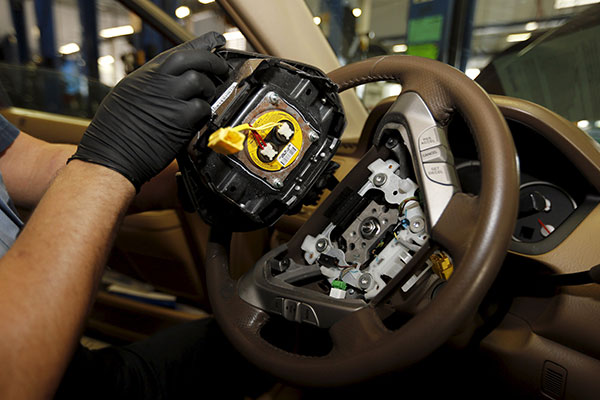|
 |
|
An auto mechanic displays a recalled Takata airbag. [Photo/China Daily] |
2.4 million autos recalled since April 2014
China's quality watchdog has recalled more than 2.4 million cars from nine different brands across the nation due to a number of safety issues involving an airbag manufactured by Tokyo-based Takata Corp.
The General Administration of Quality Supervision, Inspection and Quarantine has issued recalls on 37 imported and domestically produced models made from 1999 to 2013 from brands that include Honda, Toyota, Lexus, Nissan, Infiniti, Mazda, Subaru, Mitsubishi, and BMW.
China's recalls began in April of last year, although Takata denied there were any casualties in China as a result of its airbags.
Honda announced last week an expanded recall for the faulty airbag worldwide.
The Chinese watchdog said the passenger car airbags run the risk of ejecting shell fragments when it deploys and inflates, while other airbags simply do not inflate upon collision. It said defective airbags and parts related to it will be replaced with a new one free of charge.
Data from Takata showed that its defective airbags have killed eight people worldwide and caused nearly a hundred injuries from 2013 through last month, according to the administration. The United States, Japan and India have also issued recalls of autos using Takata airbags.
Takata mainly supply its driver and front passenger side airbags to automakers in the United States, Japan and China. Chinese media reported that Chinese brand, include SAIC, FAW, Dongfeng and Geely, also use Takata airbags, but no recall was filed.
Wang Hongyan, a professor of automotive technologies at Tongji University in Shanghai said the irregular deployment of the airbags is a result of substandard parts in the bag's inflator.
"The inflator might not generate enough gas and power to push the airbags out. Instead, it blows the inflator shell (covering the airbag) and metal shards fly out," she said.
Takata first established a division in China in 2002 and currently operates three plants in Shanghai, Tianjin and Hubei province. According to its annual report, net sales increased 51.6 percent to 139.9 billion yen ($1.8 billion) last year due to increased sales in China and gains from a depreciation of the Japanese currency.
"A car owner will never know whether the airbags are good or bad unless the carmaker files a recall. And a car owner who is concerned about the bags' safety can only replace the two airbags at a cost of more than 10,000 yuan ($1,634)."
Takata airbags first came under scrutiny several years ago after an investigation by the US National Highway Traffic Safety Administration. Subsequent tests in the US, Japan and China all cleared the airbags. Many models, in fact, received five-star safety assessments, although these tests only examine a car immediately after it is produced.
"An airbag is supposed to work well unless the car is damaged in a flood. Even the water from a downpour should not affect an airbag's harness," Wang said.
The reliability of an airbag is not among those checked in a regular maintenance checkup and there is no way to physically examine an installed airbag. Most passenger cars have an indicator on the dashboard to indicate when an airbag has problems only with its electric wiring.
Auto analyst Jia Xinguang said the Takata airbags are installed mainly in mid-and low-end cars.
"Takata positioned itself in the budget market, and has to meet the low-end demands with price advantages. Takata replaced the traditional raw materials with its low cost new materials," Jia said. "Some carmakers constantly cut parts procurement expenses including airbag costs."
